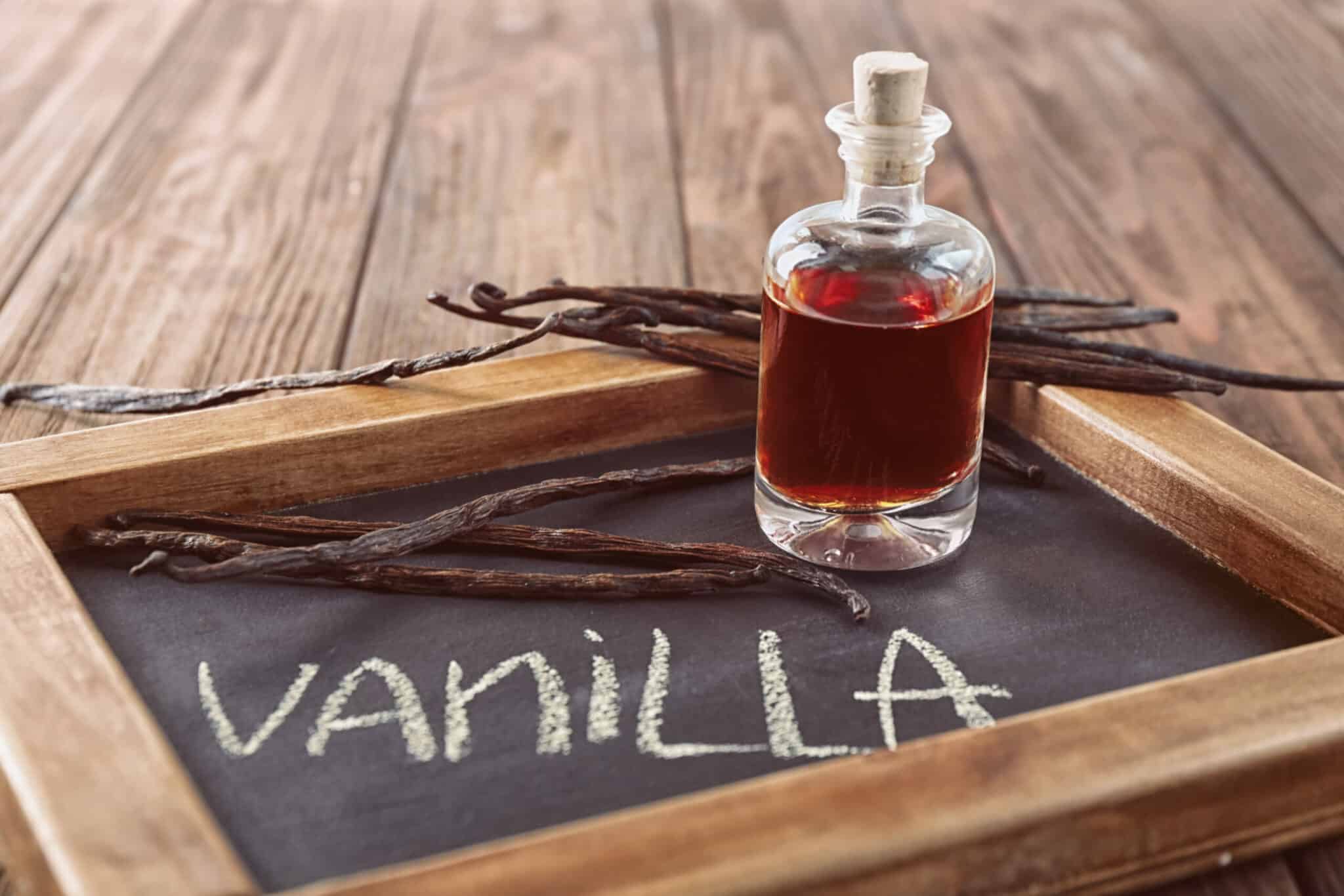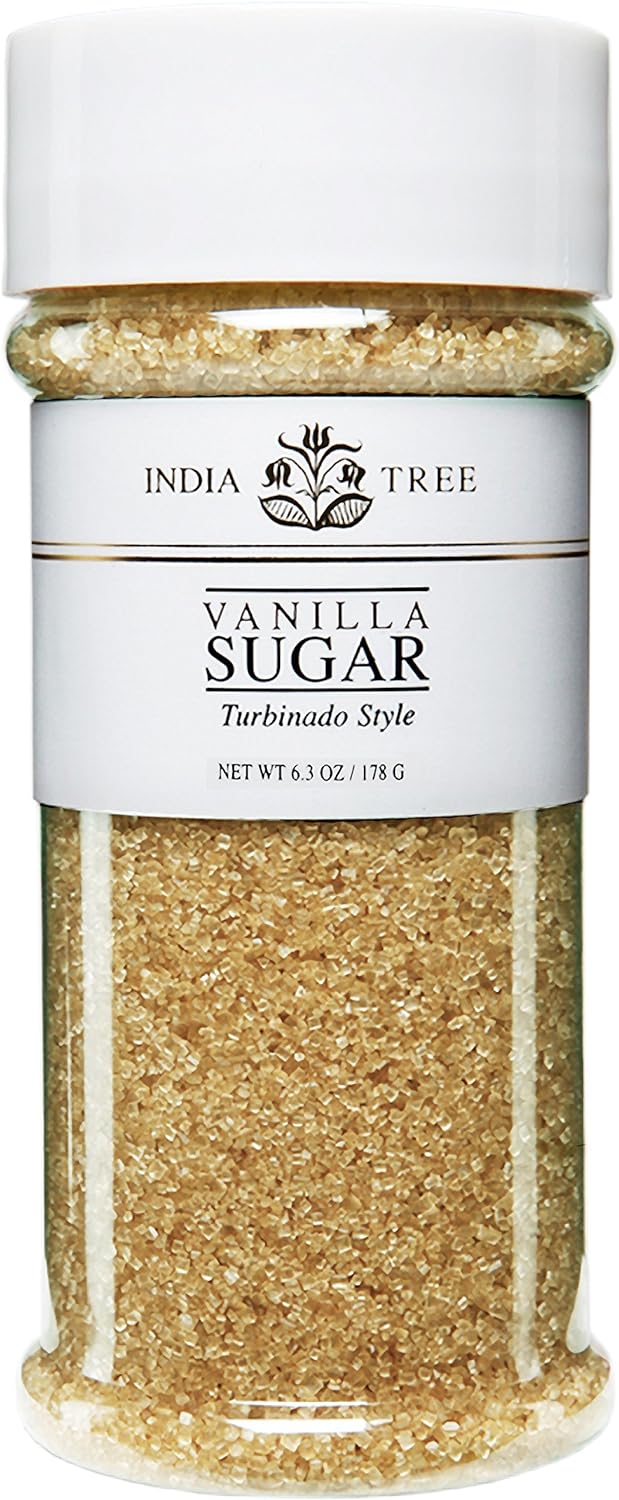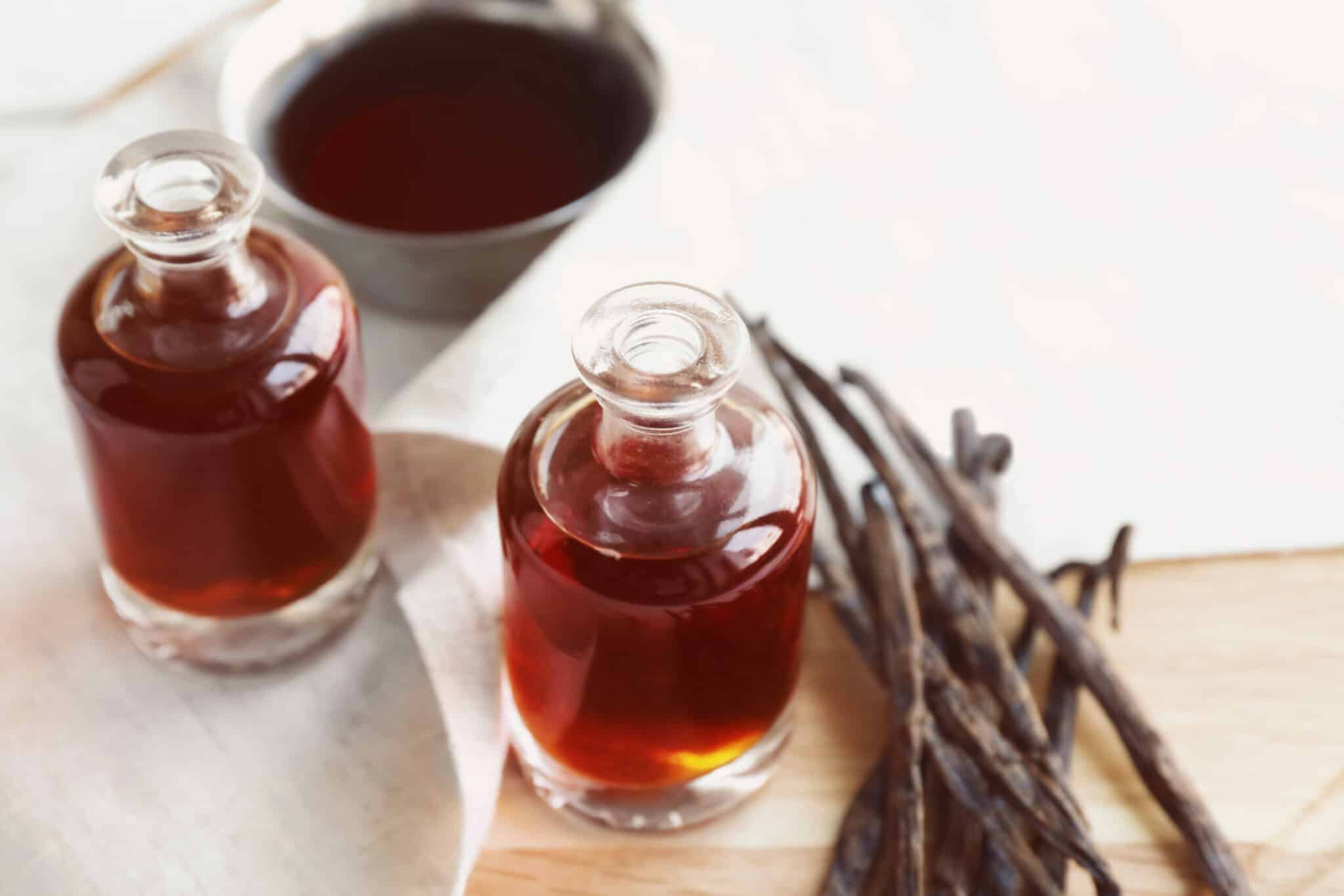Vanilla extract is a common flavouring in many desserts and baked goods. People can use a variety of substitutes in a pinch, but some may be better suited to specific recipes than others. The pods of the tropical vanilla orchid Vanilla planifolia are used to make pure vanilla extract. The pods contain tiny black seeds high in vanillin, responsible for the liquid flavouring’s deep, rich flavor. Vanilla extract is used in many baked goods and sweet recipes. A small amount adds an intense, aromatic flavor that complements other flavours.

There are numerous reasons why someone might want to substitute vanilla extract. They may have run out, prefer the flavor of a substitute, or prefer an alcoholic alternative. According to FDA regulations, the vanilla extract must contain at least 35% alcohol, and the flavor can only come from vanilla beans.
There are several vanilla extract substitutes. While some substitutions may work well in specific recipes, others may be preferable. Using the correct substitution ratio because vanilla extract and its substitutes have a strong flavor. Remember that concentration levels can vary, especially with homemade products.
Here are the top substitutes for vanilla extract
1. Fresh vanilla bean pods or vanilla paste

If you have vanilla beans on hand, this could be the best vanilla extract substitute because it has the same flavor as vanilla extract and will not change the intended flavor of your recipe. If you have vanilla bean paste, it can be used as a 1:1 for its substitute. If you’re using fresh vanilla bean, use half a vanilla bean’s seeds for every teaspoon of vanilla extract called for in a recipe.
2. Vanilla powder

The vanilla powder has a more intense flavor than vanilla extract. Vanilla beans are ground into a fine powder to make it. You should use half the amount of vanilla powder in the recipe. Use 1/2 teaspoon vanilla powder instead of 1 teaspoon vanilla extract in a recipe that calls for one teaspoon vanilla extract. Because the vanilla powder is derived from vanilla beans, it may be the second-best substitute for vanilla extract.
3. Vanilla sugar

Vanilla sugar is sugar that has been infused with vanilla beans. While it can be challenging to find in the United States, it is widely used in Europe. Vanilla sugar can be used in place of regular sugar when baking. We can also sprinkle it on freshly baked pies, cookies, and cakes. Substitute vanilla sugar for regular sugar in a recipe and leave out the vanilla extract.
4. Pure Maple syrup

We can replace vanilla extract with maple syrup, and you can use the same maple syrup as vanilla (1:1 replacement). Because maple syrup has a sweeter flavor than vanilla extract, you may want to slightly reduce the sugar in your recipe to balance the sweetness. You can also try maple extract, which contains less sugar than maple syrup.
5. Honey

You can substitute honey for vanilla extract in recipes, just like maple syrup. You’d use it as a 1:1 substitute for the amount of vanilla extract called for in a recipe! Honey, like maple syrup, can be used in place of vanilla extract. In a baking recipe, you can substitute 1:1. Because honey is sweet, you should reduce the sugar to balance the sweetness.
Rum, Brandy, Bourbon, or Vanilla Liqueur. Because they have a slightly sweet aftertaste, rum, brandy, and bourbon all make excellent vanilla extract substitutes. Because you soak the vanilla beans in vodka when making your vanilla extract, having an alcohol substitute works well in baking recipes, and you can use a 1:1 replacement.
Furthermore, because alcohol does not spoil, you could keep some vanilla-flavoured liqueur in your liquor cabinet, as vanilla-flavoured liqueur has a flavor profile similar to vanilla extract in baking recipes! It can also be used as a 1:1 substitute.
6. Almond extract

It can be an excellent substitute for natural vanilla extract if you have almond extract. It adds a nice flavor to baking recipes and gives your sweet recipes a slightly nutty flavor rather than vanilla flavor, and it adds an excellent depth of flavor, in my opinion.
7. Vanilla essence

Instead of the natural vanilla bean from which vanilla extract is made, vanilla essence is made from synthetic vanilla (artificial vanilla). As a result, the vanilla flavor is not as strong. You will need twice as much vanilla essence if you use it. If a recipe calls for one teaspoon of vanilla extract, use two teaspoons of vanilla essence instead.
8. Plant-based vanilla flavored milk

It may surprise you that plant-based milk with vanilla flavouring is an excellent substitute for vanilla extract! We can replace vanilla extract with unsweetened vanilla almond milk, soy milk, or oat milk. We can substitute it in a 1:1 ratio (so if a recipe calls for one teaspoon of vanilla extract, use 1 tsp of milk as a substitute).
If a milkshake or smoothie calls for vanilla extract, you can substitute vanilla milk or even vanilla ice cream!
9. Espresso powder or instant coffee

This vanilla substitute works best in chocolate recipes because it enhances the flavor of the chocolate! It would also be delicious in savoury dishes. You only need a pinch – no need to make a 1:1 substitution. A small amount goes a long way!
10. Liquor with vanilla flavor

Because vanilla extract is made from vanilla beans and alcohol, it should be no surprise that you can substitute vanilla-flavoured liquor for vanilla extract, as the alcohol content will “cook off” while baking.
Use a 1:1 ratio and enjoy your bartending skills!
11. Syrup with vanilla flavor

Doesn’t it work for coffee? However, flavoured syrups are generally very sweet, so reduce the amount of sugar in the recipe.
Because baking is precise, resulting in a wetter batter, this substitute works best in liquid recipes or with items like brownies, puddings, or no baked items.
12. Ice cream with vanilla

This substitution works best when making another frozen recipe, such as frozen yogurt, milkshakes, floats, or smoothies. Still, We can also use vanilla ice cream to source delicious vanilla flavor.
Vanilla ice cream can be your secret ingredient’ in baking to turn some essential recipes into 3-ingredient recipes (or 4, or 5) like blueberry muffins.
Of course, it will make the recipe milky and creamy, so lactose-intolerant people should avoid it.
Love vanilla? Try out these recipes
1. Best vanilla cake
This vanilla cake recipe is the best for a reason. By incorporating creamy vanilla bean paste into the moist, rich cake batter, you get a potent vanilla flavor that you can’t get in stores. To finish, spread vanilla buttercream frosting on top.
2. Vanilla-glazed Ginger scones
Gingerbread complements a wide range of delectable holiday baked goods. Dip a fork or spoon into the glaze mixture and drizzle over the tops of the ginger scones to glaze them.
3. Chilean monkey tail punch
The origins of this punch’s unusual name are unknown. Some say it was named after a funny incident with a Chilean president in the early 1900s, while others say it was named after a bottle depicting a monkey with a long tail. Whatever the origin, the combination of coffee and spirits will warm you right up this Christmas. It is also known as “cola de mono.”
4. Best ever bread pudding
The key to making fantastic bread pudding with a soft center and crisp edges begins with leftover dinner rolls. You can also get the rich brown sugar sauce recipe, and a generous drizzle of it elevates this dessert to new heights, making it the best bread pudding ever.
5. Vanilla bean Angel food cake
Everyone’s favourite blank canvas for creating amazing desserts is angel food cake. Serve it plain or with fresh fruit, chocolate sauce, or nutty sprinkles.
What are some cookie substitutes?
To make cookies, you can use maple syrup, honey, almond extract, vanilla essence, vanilla powder, vanilla sugar, or alcohol like bourbon. If you don’t have any of those options, you can omit the vanilla extract or a substitute from the cookies entirely, as the chocolate chip flavor is what the cookies are all about. Just keep in mind that some of the suggested substitutions, such as almond extract, honey, maple syrup, and alcohol, will alter the final flavor.
In a recipe, how important is vanilla extract?
Vanilla extract is not required for the structure of a baking recipe; however, omitting it from a recipe will alter the flavor. The vanilla extract improves the flavor of cookies, cakes, muffins, and other baked goods. There shouldn’t be much difference in taste as long as vanilla isn’t the main ingredient. Because the amount of liquid that vanilla extract contributes to a recipe is usually negligible, there is no need to substitute it.
Is it possible to make my own vanilla extract?
Yes! If you don’t want to use one of these vanilla extract substitutes, you can make your vanilla extract with just two ingredients. It does, however, take time and patience. You can’t make vanilla extract while baking, and the vanilla bean paste and alcohol must infuse for at least one month.
What alcohol is best for making vanilla extract?
Vodka has a neutral flavor that lends itself well to vanilla flavouring. Use rum, brandy, or a bottle of bourbon instead. It is not necessary to use expensive alcohol; it is the alcohol content that is important (80 proof). The FDA requires that pure vanilla extract be at least 70 proof or 35 percent alcohol, making Vodka excellent for vanilla extraction. The main benefit of using Vodka is that it is odourless and tasteless, allowing the full flavor of the vanilla to take centre stage.
How Long does homemade vanilla extract last?
A vanilla extract made from vanilla beans and alcohol lasts indefinitely. Vanilla essence or imitation vanilla extract purchased will last at most two years. Because it is pure vanilla extract, homemade vanilla extract will last the same amount of time as the pure vanilla extract is made with the appropriate amount of pure alcohol. The pure vanilla extract should last 5–10 years, depending on storage conditions, whether homemade or purchased.
Why would you substitute?
For a variety of reasons, people substitute vanilla extract. They may run out of vanilla extract in the middle of baking, or they may enjoy experimenting with various ingredients. Some people prefer to use alcohol-free ingredients to avoid vanilla extract, which contains at least 35% alcohol. Bakers may prefer a colourless vanilla extract alternative when making light-coloured cakes or frostings. While vanilla extract can turn pale batters brown, substitutes such as vanilla powder have a more subtle effect.
How can you make homemade vanilla extract?
Allow the beans to infuse for at least a month. Wait a few months for the best results and a more robust flavor. Vanilla extract, like wine, gets better with age. There’s no need to use premium liquor, and a low-cost 80 percent proof will suffice. Keep vanilla extract in an excellent, dark location.
Feel free to experiment with different flavor extracts in your vanilla! Peppermint extract, orange extract, lemon extract, and almond extract are some of our favourites. When it comes to whole vanilla beans, pretty much any type will do! You can even combine different beans to create a more complex flavor. Use vanilla extract in a variety of recipes besides baking! Vanilla is an excellent ingredient for cocktails, grill marinades, savoury sauces (BBQ sauce, tomato sauce, etc.), coffee, and even smoothies!
Is it okay to use imitation vanilla?
Imitation vanilla flavor, also known as “vanilla essence,” is less expensive than pure vanilla extract. You may be wondering if paying more for pure vanilla extract makes a difference. Many chefs believe that pure vanilla is the only way for recipes where vanilla is the primary flavor component, such as pound cake or ice cream. Pure vanilla extracts contain hundreds of chemical compounds, such as vanillin, tannins, and polyphenols, which give them a rich, robust flavor profile. Pure vanilla is also prized for its antioxidant content and potential medicinal properties, though much of the research on this subject is older. When vanilla is used as a secondary flavor component, or if imitation vanilla is all that’s available, substituting it for pure extract at a 1:1 ratio should suffice.
Conclusion
Vanilla extract adds a distinct, complex flavor to many dishes and baked goods. People may use a substitute because they have run out of vanilla extract, prefer the flavor and texture of another option, or prefer an alcohol-free option. It is critical to use the correct substitution measurements and ensure that the substitution is suitable for the recipe. People can experiment with various combinations and ratios, adjusting the amounts as necessary.
